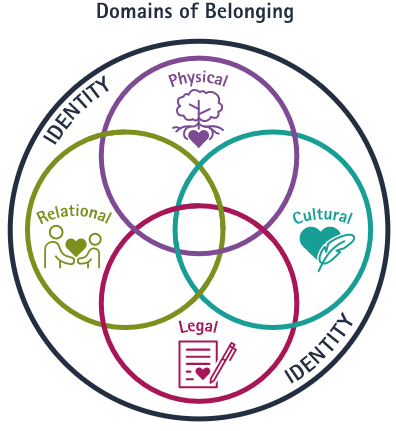Skye’s Legacy
The Importance of Belonging
What are we talking about?
Why does it matter?
How did we get here?
Who was Skye?
What did we learn from her?
What are we talking about?
The importance of belonging – a child’s sense of connection to people, community, culture, place and a positive sense of identity – has been understood, explored, encouraged, researched and celebrated by many families, communities, organizations and Nations over time. RCY is pleased to collaborate with and learn from others who share a commitment to creating belonging and connection with and for young people in B.C. We are delighted on this page to offer a curated collection of resources developed by our RCY team and others that we hope will be instructive and helpful.
Why does it matter?
Every child needs to have deep connections and to feel a sense of belonging to culture, community, family and place in order to thrive and develop a positive sense of self. Children and youth who are in government care, in particular, need to feel these connections as they have typically experienced trauma during their young lives. Without these connections, they may experience what Dr. Martin Brokenleg has referred to as “unbelonging”. And as a consequence, they may experience pain, sadness, distress, risk and poorer life outcomes.
How did we get here?
In June 2021, RCY released an investigative report entitled Skye’s Legacy: A Focus on Belonging. This was a pivotal report for our Office, in particular because it changed our understanding of how the system might best help young people, particularly First Nations, Métis, Inuit and Urban Indigenous children and youth who are in government care and often dealing with the effects of intergenerational trauma. We chose to investigate Skye’s life because it reflected the stories of many First Nations, Métis, Inuit and Urban Indigenous children that RCY sees in its day-to-day advocacy and reviews and investigations work.
Who was Skye?
Skye was a bright, young First Nations girl who died of an accidental drug poisoning on her 17th birthday. She was a child who was full of hope, potential and somebody who “bubbled with energy” and our report concluded that her life could have taken a much different path had she been provided with the sense of belonging that she needed. Instead, Skye was placed in government care at the age of five and never saw her mother again, lived in a series of foster homes, endured three failed adoption plans and multiple moves between placements and communities, and wasn’t provided with opportunities to meaningfully connect with her extended family or her Dene culture.
What did we learn from her?
Skye’s story illustrates what can happen when children and youth aren’t provided with the opportunity to belong – to feel connection to people, place, culture and a positive sense of self. A narrow focus on trying to ensure that Skye was adopted (to achieve legal permanency) came at the expense of all other aspects of her belonging. Researching and telling her story convinced us that we need to think differently about the system’s main responsibility to every child in care – the need to create and nurture belonging. Skye’s story convinced us that belonging should be the lens through which all decisions are made and all actions are taken in planning and caring for a child.
Introductory Video

Domains of Belonging
Physical
Comes through a child’s connection to their physical environment, including home, school, lands and community
Cultural
Comes through a child’s constant connection to ancestry, traditional customs and language, and support from their community
Legal
Refers to a child’s legal permanency status (e.g., adopted, in continuing care, in an extended family placement, etc.)
Relational
Comes through a child’s strong, stable relationships with family, extended family, friends, community, service providers, etc.
Identity
Refers to the sum of a child’s formative experiences associated with belonging to people, place and culture and their consequent sense of themselves as having a distinct and positive identity and future
RESOURCES ON BELONGING

What’s New
Here we feature latest webinars, new resources
* By submitting your email, you agree to our privacy policy and are opting to receive communication from Representative for Children and Youth.
